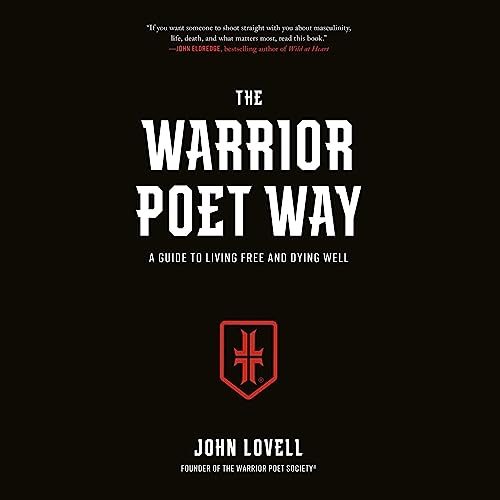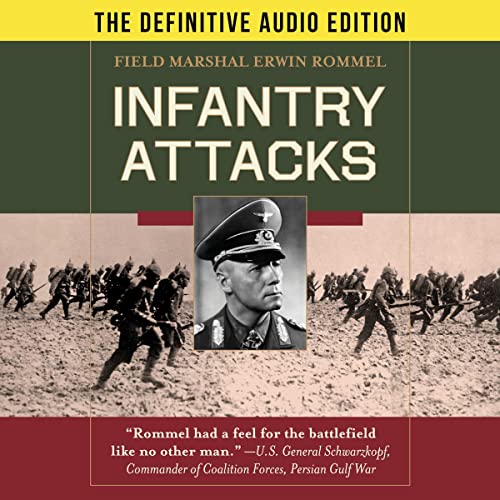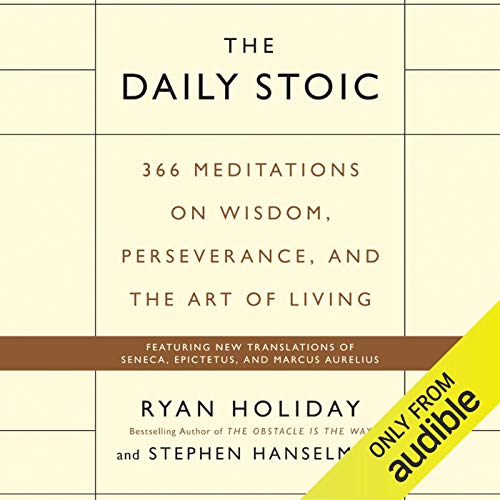
 Audible sample
Audible sample  Playing...
Playing... 
 Paused
Paused  Your audiobook is waiting!
Your audiobook is waiting!
Enjoy a free trial on us
$0.00$0.00
- Click above for unlimited listening to select audiobooks, Audible Originals, and podcasts.
- One credit a month to pick any title from our entire premium selection — yours to keep (you'll use your first credit now).
- You will get an email reminder before your trial ends.
- $14.95$14.95 a month after 30 days. Cancel online anytime.
Buy
-12% $18.15$18.15
On Killing: The Psychological Cost of Learning to Kill in War and Society
 Audible Audiobook
– Unabridged
Audible Audiobook
– Unabridged
The revised and updated edition of Lt. Col. Dave Grossman's modern classic about the psychology of combat, hailed by the Washington Post as "an illuminating account of how soldiers learn to kill and how they live with the experiences of having killed". In World War II, only 15 to 20 percent of combat infantry were willing to fire their rifles. In Korea, about 50 percent. In Vietnam, the figure rose to more than 90 percent.
The good news is that most soldiers are loath to kill. But armies have developed sophisticated ways sophisticated ways of overcoming that instinctive aversion. The psychological cost for soldiers, as evidenced by the increase in post-traumatic stress, is devastating. This landmark study brilliantly illuminates the techniques the military uses to help soldiers kill and raises vital questions about the implications of escalating violence in our society.
- Listening Length10 hours and 23 minutes
- Audible release dateJune 22, 2009
- LanguageEnglish
- ASINB002EAS5KQ
- VersionUnabridged
- Program TypeAudiobook
People who viewed this also viewed
- Audible Audiobook
- Audible Audiobook
- Audible Audiobook
- Audible Audiobook
- Audible Audiobook
People who bought this also bought
- Audible Audiobook
- Audible Audiobook
- Audible Audiobook
- Audible Audiobook
- Audible Audiobook
Related to this topic
- Audible Audiobook
- Audible Audiobook
- Audible Audiobook
- Audible Audiobook
- Audible Audiobook
Product details
| Listening Length | 10 hours and 23 minutes |
|---|---|
| Author | Lt. Col. Dave Grossman |
| Narrator | Lt. Col. Dave Grossman |
| Audible.com Release Date | June 22, 2009 |
| Publisher | Hachette Audio |
| Program Type | Audiobook |
| Version | Unabridged |
| Language | English |
| ASIN | B002EAS5KQ |
| Best Sellers Rank | #9,625 in Audible Books & Originals (See Top 100 in Audible Books & Originals) #5 in Military Science #16 in Violence in Society (Books) #16 in Violence in Society (Audible Books & Originals) |
Customer reviews
Customer Reviews, including Product Star Ratings help customers to learn more about the product and decide whether it is the right product for them.
To calculate the overall star rating and percentage breakdown by star, we don’t use a simple average. Instead, our system considers things like how recent a review is and if the reviewer bought the item on Amazon. It also analyzed reviews to verify trustworthiness.
Learn more how customers reviews work on Amazon-
Top reviews
Top reviews from the United States
There was a problem filtering reviews right now. Please try again later.
The questions are arising now. The answers are in our history. We must understand where we've been, to understand where we are going.
Col. Grossman provides a rich history and excellent perspective on where we are going as a culture. His insight is unsurpassed. I Wish I would have read this years ago.
Col. Grossman also provides application to the knowledge supplied in the book.
If you are, or desire to be Law Enforcement, or if you are merely a concerned citizen or parent, this book will help prepare you for the challenges of the future. Read it, and read it again.
Read it in conjunction with "On Combat: The Psychology and Physiology of Deadly Conflict in War and... "
Overall the book is a fast, easy read. History can be tedious, Col Grossmans portrayal is engaging. The points he makes are reinforced with his own personal accounts, and testimonies from soldiers and warriors of days gone by.
The book is highly researched and extremely well written. In his book, the author investigates the effects that killing and war have on the human psyche. Pulling from the current body of knowledge that exists in the medical field and other written works, the author highlights key discoveries on the psychological cost of killing and war, and develops several original ideas which are insightful and well supported. The true cost of war is not found in the dollars spent on financing the war effort, but on the physical and psychological trauma that results from it.
I would recommend this book to anyone who wants to understand more about killing and war and about the wanton acts of homocide that plague our society. I would highly recommend this book to anyone in the military, as I myself am in the military and find the book edifying. Finally, I would recommend this book to anyone who works in politics or plans to enter political service.
The underlying thesis of "On Killing" is that mankind is instinctively hard wired Not To Kill. How I wish that was true, and yet our bloody record across recorded history and plenty of evidence even prior to recorded history shows the exact opposite. We are, by instinct "killer angels." Read "War Before Civilization" as but one counter argument. But directly to my concern about the author's sources. "SLAM" Marshall's reputation was built on alleged interviews, hundreds of them, immediately after combat during WWII in which he asserts that at least 75% of combat infantry never fired their weapons, thereby proving that soldiers, at least American soldiers abhor killing and try to avoid doing so even at the risk of their lives.
Marshall's work was called into serious doubt in the late 1980s by one history who simply ran a "time analysis" on how many soldiers Marshall claimed to have interviewed and came up with an impossible number of hours to have achieved the number of interviews he claimed, in other words falsified data which was turned about to fit his thesis. David Hackworth, who served with Marshall was scathing in his comments about serving directly with the man. When it comes to WWII I feel the author of "On Killing" neglected a near infinite number of variables that affect men in combat. . .green vs. veterans, nature of combat, open field vs. the terror of close up urban where indeed one or two of a squad are usually heavily engaged with the rest provide cover, hauling ammunition for machine guns and back up, etc. Even more significant, as Keegan repeatedly points out in his exceptional works, the level of brutality rapidly escalates due to such issues as defense, especially if defending one's own country from invasion verse offense, difference in ethnicity and especially difference in race and religion which truly trigger the darker side of our nature. But one example, German troops transferred from the Russian front to France were actually briefed that this was now a different enemy and rules of war again apply. As to "our guys" in that war, I have yet to interview a vet of the Pacific War who said there was any civility or urge not to kill, the hatred ran that deep, fueled as well by racial difference. In the European theater any vet I interviewed would almost smile when discussing combat against Italian troops, but when confronting the Waffen SS it was to the death and usually no prisoners and fought by all with hatred.
I know this is a long review but I must comment on a second topic the author covers at length and that is our Civil War and what I felt was his over reliance on the works of "Paddy" Griffith, yet another author I have respect for even when I disagree. The author of "On Killing" dwells repeatedly on the fact that on average between 200-250 rounds were fired for each casualty inflicted and thus again leaps to the conclusion that this demonstrates his thesis that soldiers on both sides, either deliberately aimed high, or even went so far as to mimic loading their guns and not firing at all.
I must counter on several points. The author asserts that the typical range of Civil War combat was 30 yards. Definitely not true! (a belief shored up by such films as Patriot or even the opening scene in Glory). Typical range, especially as the war dragged out and killing effectiveness increased, was typically two hundred yards or more. Close in volley fights, at fifty yards or less, such as Groveton, August 1862 were indeed rare, except when opposing sides tangled into each other in woods such as at the Wilderness.
I've personally run some live fire tests with others and not just reenactments with everyone running about shooting blanks. The biggest factor affecting aimed fire. . .smoke, and smoke and more smoke, carpets of it that within minutes all but blinded both sides. At two hundred and fifty yards a mis-aim of even a few millimeters too high translates into a minie ball into the tree tops four hundred yards away. Third, try putting a percussion cap on the nipple of a rifled musket when all is confusion and terror, and finally something we of course could not simulate, the fear because "they are shooting back." Add in exhaustion, bad food, close friends torn apart by your side, these were the deciders of rifle fire effectiveness, not a 75% rate of those who refused to kill no matter what the situation. The author cites the number or rifles found at Gettysburg with two or more bullets rammed into them and to my amazement asserts that to actually then put on a percussion cap and fire it for real would clean out the half dozen or more minie balls and powder charges jammed in. I would suggest handing that assignment over to Myth Busters and standing well clear. I ascribe this to terrified kids who in many cases first jammed a bullet down the barrel rather than the powder and in the confusion did not even know they were no longer shooting. I actually have done that a few times with loading, thinking I had fired but the percussion cap had fallen off then loaded again, (firing blanks only) and the kickback was certainly a shocker and realization that even in a simulation I could get rattled!
Definitely time for a conclusion I think. I give this book four stars because it is obviously well researched even though I think the author has "chased his thesis up the wrong tree," I nevertheless welcome the debate it creates. I do wish I could hold a more optimistic view of humanity when it comes to the subject of our brutality towards each other. A point I do wish had been covered in more detail is my own belief that high technology weapons and media now make killing even easier. We no longer look directly into the eyes of the man we kill, hear his screams and see that "inner light" go dark. Our alleged entertainment usually involves brutal deaths, the more the better in the latest James Bond movie for example, Youtube and other sources are flooded with "cool" night vision footage of enemies being blown apart and though I do detest the Taliban and their creed as an enemy we must confront, it is a bit disturbing when watching a human being shredded by 30mm cannon fire and to read the comments that it is "cool." It has become the desensitizing conditioning of first person "shoot `em ups" of Xbox translated into realities.
Even if you disagree with the author's thesis that we as a species recoil from killing, the book will nevertheless provoke reflective thought and I am seriously considering using it as text book in my classes that deal with warfare.
Top reviews from other countries
I will undoubtedly reflect after or even during tasks to consider what effects situations maybe having upon ourselves.
I certainly will continue to refuse to buy my children certain computer games!


















